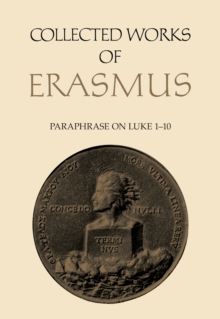
The Correspondence of Erasmus : Letters 1252 to 1355, Volume 9 PDF
by Desiderius Erasmus
Part of the Collected Works of Erasmus series
Description
At the beginning of this volume, Erasmus leaves Louvain to live in Basel.
Weary from the many controversies reflected in the letters of the previous volumes, he is also anxious to see the annotations to his third edition of the New Testament through Johann Froben’s press.
Above all he fears that pressure from the imperial court in the Netherlands will force him to take a public stand against Luther. Erasmus completes a large number of works in the span of this volume, including the Paraphrases on Matthew and John, two new expanded editions of the Colloquies, an edition of De conscribendis epistolis, two apologiae against his Spanish detractors, and editions of Arnobius Junior and Hilary of Poitiers.
But the predominant theme of the volume remains ‘the sorry business of Luther.’ The harder Erasmus persists in trying to adhere to a reasonable course between Catholic and reforming zealots, the more he finds himself ‘a heretic to both sides.’ His Catholic critics appear the more dangerous.
Among them are the papal nuncio Girolamo Aleandro, who is bent on discrediting him at both the imperial and papal courts as a supporter of Luther; the Spaniard Diego López Zúñiga, who compiles a catalogue of Blasphemies and Impieties of Erasmus of Rotterdam; and the Carmelite Nicholaas Baechem, who denounces Erasmus both in public sermons and at private ‘drinking-parties.’ Erasmus’ refusal to counsel severity against the Lutherans is motivated chiefly by concern for peace and the common good of Christendom, and not by any tender regard for Luther and the other reformers.
Still, many of the letters in this volume testify to his growing aversion to the reformers, and we see him moving perceptibly in the direction of his eventual public breach with them. A special feature of this volume is the first fully annotated translation of Erasmus’ Catalogues Iucubrationum (Ep 1341 A), an extremely important document for the study of Erasmus’ life and works and of the controversies they aroused. Volume 9 of the Collected Works of Erasmus series.
Information
-
Download - Immediately Available
- Format:PDF
- Pages:495 pages
- Publisher:University of Toronto Press
- Publication Date:01/11/1989
- Category:
- ISBN:9781442680944
Other Formats
- Hardback from £102.00
Information
-
Download - Immediately Available
- Format:PDF
- Pages:495 pages
- Publisher:University of Toronto Press
- Publication Date:01/11/1989
- Category:
- ISBN:9781442680944










